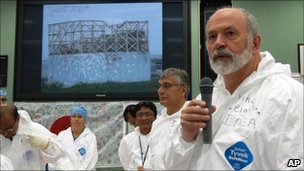BAK
JF-Expert Member
- Feb 11, 2007
- 124,790
- 288,009
[h=1]IAEA considers nuclear safety rules after Fukushima[/h]

The IAEA has highlighted some of the weaknesses that contributed to the crisis
The UN's nuclear watchdog is holding a meeting aimed at improving nuclear safety, in the wake of the accident at Japan's Fukushima plant.
Officials from 150 nations are meeting at the International Atomic Energy Agency (IAEA) offices in Vienna to discuss how to make nuclear more safe.
But there are differences as to how much international action is needed to prevent future accidents.
The meeting will also discuss a report into the Fukushima nuclear emergency.
The BBC's Bethany Bell in Vienna says some states argue the details of safety regulation should be left to the governments concerned.
Others want the IAEA's guidelines to be made mandatory under international law. At the moment there are only standards and guidelines set by the IAEA.
'Unprecedented emergency' The Fukushima disaster has prompted widespread public concern about nuclear safety.
The nuclear plant's cooling systems were knocked out by the 11 March earthquake and tsunami. The disaster caused meltdown at three of the reactors.
[h=2]Fukushima update (20 June)[/h]
Germany has decided to shut down all its reactors by 2022 and Italy has voted against plans to revive nuclear power.
The IAEA report on the Fukushima accident is to be published on Monday at the conference.
Leaks from the report indicate it has found that Japan did not follow all the proper guidelines for how to respond to the crisis.
It failed to follow some safety measures, and did not learn from past threats to nuclear plants in areas prone to tsunami risk, according to leaks.
But it will also praise the dangerous and hard work carried out by Japan's nuclear workers.
"The operators were faced with a catastrophic, unprecedented emergency scenario with no power, reactor control or instrumentation," the 160-page report will say.
Some 110,000 tonnes of water have built up during efforts to cool reactors since the twin natural disasters, hampering work to bring the plant under control.
The contaminated water, enough to fill 40 Olympic-sized swimming pools, is increasing by 500 tonnes a day as fresh water is continuously being injected to cool the reactors.
An operation on Friday to decontaminate the water was abandoned after just a few hours because of a rapid rise in radiation.
Japanese broadcaster NHK reported that storage facilities are filling up, so a delay in restarting the filtering system could cause the water to overflow into the sea in about a week.
Fukushima is the world's worst nuclear accident since Chernobyl in Ukraine in 1986.

The IAEA has highlighted some of the weaknesses that contributed to the crisis
The UN's nuclear watchdog is holding a meeting aimed at improving nuclear safety, in the wake of the accident at Japan's Fukushima plant.
Officials from 150 nations are meeting at the International Atomic Energy Agency (IAEA) offices in Vienna to discuss how to make nuclear more safe.
But there are differences as to how much international action is needed to prevent future accidents.
The meeting will also discuss a report into the Fukushima nuclear emergency.
The BBC's Bethany Bell in Vienna says some states argue the details of safety regulation should be left to the governments concerned.
Others want the IAEA's guidelines to be made mandatory under international law. At the moment there are only standards and guidelines set by the IAEA.
'Unprecedented emergency' The Fukushima disaster has prompted widespread public concern about nuclear safety.
The nuclear plant's cooling systems were knocked out by the 11 March earthquake and tsunami. The disaster caused meltdown at three of the reactors.
[h=2]Fukushima update (20 June)[/h]
- Reactor 1: Partial meltdown from cooling problems. Building holed by gas explosion. Radioactive water detected in reactor and basement
- Reactor 2: Partial meltdown from cooling problems. Building holed by gas blast; containment damage suspected. Highly radioactive water detected in reactor and adjoining tunnel
- Reactor 3: Partial meltdown from cooling problems. Building holed by gas blast; containment damage possible. Spent fuel pond partly refilled with water after running low. Radioactive water detected in reactor and basement
- Reactor 4: Reactor shut down prior to quake. Fires and explosion in spent fuel pond; water level partly restored
- Reactors 5 & 6: Reactors shut down. Temperature of spent fuel pools now lowered after rising high
Germany has decided to shut down all its reactors by 2022 and Italy has voted against plans to revive nuclear power.
The IAEA report on the Fukushima accident is to be published on Monday at the conference.
Leaks from the report indicate it has found that Japan did not follow all the proper guidelines for how to respond to the crisis.
It failed to follow some safety measures, and did not learn from past threats to nuclear plants in areas prone to tsunami risk, according to leaks.
But it will also praise the dangerous and hard work carried out by Japan's nuclear workers.
"The operators were faced with a catastrophic, unprecedented emergency scenario with no power, reactor control or instrumentation," the 160-page report will say.
Some 110,000 tonnes of water have built up during efforts to cool reactors since the twin natural disasters, hampering work to bring the plant under control.
The contaminated water, enough to fill 40 Olympic-sized swimming pools, is increasing by 500 tonnes a day as fresh water is continuously being injected to cool the reactors.
An operation on Friday to decontaminate the water was abandoned after just a few hours because of a rapid rise in radiation.
Japanese broadcaster NHK reported that storage facilities are filling up, so a delay in restarting the filtering system could cause the water to overflow into the sea in about a week.
Fukushima is the world's worst nuclear accident since Chernobyl in Ukraine in 1986.